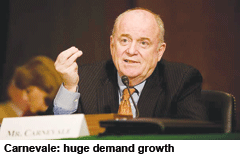If you can’t beat them, join ’em. that’s the attitude being adopted by a growing number of traditional US universities towards their private-sector rivals, as they start to branch out from their main product of graduate and undergraduate degrees into the lucrative field of professional certification which is increasingly being demanded by business and industry.
Until recently, universities have watched from the sidelines as two-year course community colleges and for-profit institutions such as the University of Phoenix cashed in on the estimated $140 billion (Rs.714,000 crore) market for career training. Now they are getting in on the act.
 “It’s a good side business for four-year colleges and graduate schools,” says Dr. Anthony Carnevale, director of the Georgetown University Center on Education and the Workforce, which is studying the trend. “The growth (of this sector) is huge.” Possibly too huge, he and others have suggested, as universities leap into the professional-certificate business without knowing if supply will soon exceed demand. “A lot of this (expansion) is speculative investment,” says Carnevale.
“It’s a good side business for four-year colleges and graduate schools,” says Dr. Anthony Carnevale, director of the Georgetown University Center on Education and the Workforce, which is studying the trend. “The growth (of this sector) is huge.” Possibly too huge, he and others have suggested, as universities leap into the professional-certificate business without knowing if supply will soon exceed demand. “A lot of this (expansion) is speculative investment,” says Carnevale.
For now, though, enrolment in such courses is encouraging. Many of the new professional certificates are being offered in such fast-growing fields as hybrid-vehicle technology, intelligence, information technology and financial regulation.
If relatively short professionally oriented courses are helping students, they are also a potential boon for universities. Professional-certificate programmes can be added and updated more quickly than conventional academic ones, and they attract students who may ultimately enroll for postgraduate courses.
But most important in these days of ever-tightening budgets, they bring in revenue, largely from mid-career students who pay the full cost without needing institutional financial aid or have employers who reimburse their tuition costs. “Very few things happen for one (single) reason but, in general, (this growth) is market driven” both for students and for universities, says Neil Braun, dean of the Lubin School of Business at Pace University. “Certificate programmes are very useful for people who see the world around them changing faster than they can keep pace, and who need an immersion educational experience in which someone can quickly bring them up to speed,” he adds.
Mercyhurst University in Pennsylvania is taking its involvement with professional certificates even further by globalising them, having opened a new centre in Dungarvan, in the Republic of Ireland, that will allow it to offer professional certificates in intelligence studies throughout Europe. All this is indicative of a “revolution in higher education”, says James Breckenridge, dean of the university’s intelligence studies department.
Community colleges on radar
Compared with its world-famous universities, America’s community colleges are virtually anonymous. But over half of the nation’s 20 million undergraduates attend them, and the number is growing fast. Poor, minority and first-generation-immigrant students are far more likely to get their tertiary education from community colleges — where two-year courses offer a cheap route to a degree — than from universities. And, increasingly, many policymakers are wondering whether more attention to community colleges might be a low-cost way of resolving the nation’s shortage of skilled workers.
America’s problem with training was laid bare in a report published last year by Deloitte, a consultancy firm, and the Manufacturing Institute. It identified 600,000 positions which were unfilled because there were too few qualified skilled workers. Too many colleges, it seems, still fail to align themselves with the needs of local employers, a mismatch that is bad both for employers and potential employees, though arguably universities are even worse at doing this.
In rare cases, companies have taken the lead — UPS has set up a training college in Louisville, Kentucky, for example. But elsewhere, community colleges have been blazing a trail with notable transformations taking place in a number of states including Michigan, Ohio and Florida. Most recently the mayor of Chicago, Rahm Emanuel, has pursued a similar strategy of matching students to companies’ requirements as part of his attempt to tackle a crisis in the city’s colleges. The city’s college graduation rate is still a dismal 10 percent, though at least that is up from 8 percent a year ago.
Under a plan produced for the mayor in December last year, each of the city’s community colleges is to be tailored for training in a specific sector of industry, such as health- care, transport or logistics. Large numbers of these kinds of jobs are expected to be created locally in the next decade. (In healthcare alone, the city expects 84,000 openings in the Chicago area.) The mayor wants to make sure local young people, rather than new arrivals from outside the city, have a shot at these positions. Malcolm X College, for example, will get a $251 million (Rs.1,280 crore) campus and its courses will be redesigned to match the needs of its new partners, such as the nearby Rush University Medical Centre.
All this chimes perfectly with the objectives of the Obama administration. The president has said he wants 2 million Americans to be trained in skills that will lead directly to a job, and has praised college-industry partnerships between businesses and community colleges in Charlotte, North Carolina and Orlando, Florida.
Such a rethink is also in tune with a new report organised under the auspices of the American Association of Community Colleges. Broadly, the report suggests that community colleges could benefit if they are given additional financial incentives based on the success of their students, in terms of graduation rates or employment, rather than simply being paid according to the numbers they enroll, as is usually the case at the moment.
(Excerpted and adapted from The Economist & Times Higher Education)